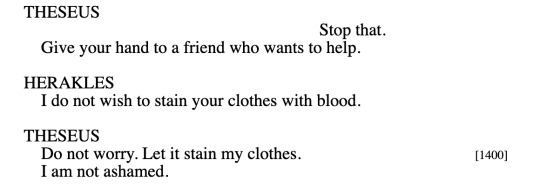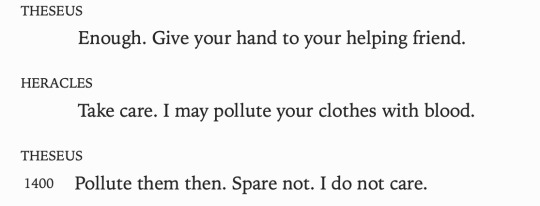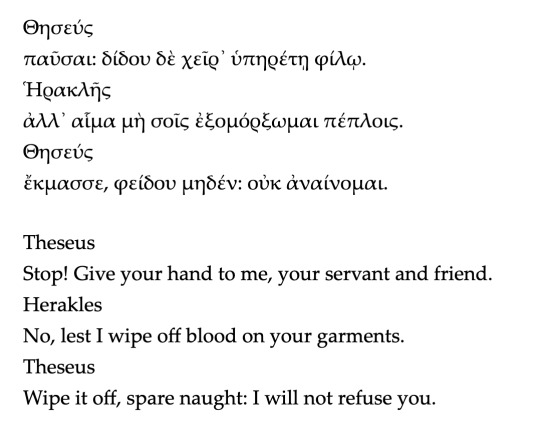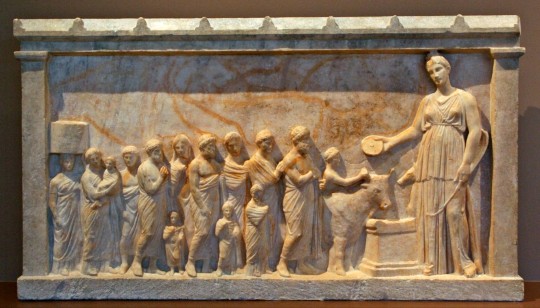#iphigenia among the taurians
Explore tagged Tumblr posts
Text

The Erinyes (The Furies) — Iphigenia Among the Taurians by André Masson
#andré masson#art#erinyes#furies#eumenides#goddesses#euripedes#vengeance#iphigenia#greek mythology#iphigenia in tauris#iphigenia among the taurians#ancient greece#ancient greek#mythology#religion#europe#european#tragedy#underworld#hell
535 notes
·
View notes
Text
i keep thinking about how euripides makes it clear iphigenia still loathes odysseus for his trickery and part in her sacrifice, and then later she saves herself and her brother through trickery -- she prevails only at her most odysseus-esque.
also something about how both taurians and helen present elaborate trickery for self-preservation as a thing the women do when the men's violence (or threats of violence) keep failing. feminine-coded odysseus. i'm sure somebody must have written academically about this somewhere.
#just like ten years of war make no headway while an elaborate last-ditch ruse succeeds#i don't know how long iphigenia is trapped by the taurians but this is post-oresteia so. god. maybe twenty years?#ooh actually that makes me a little insane. imagining iphigenia's homecoming happening concurrently with odysseus'#euripides#iphigenia among the taurians#iphigenia#helen of sparta#odysseus
72 notes
·
View notes
Text

Iphigenia Among the Taurians, Euripides, tr. Anne Carson.
13 notes
·
View notes
Quote
IPHIGENIA: —But dreams have ensavaged me.
Euripides, Iphigenia Among the Taurians (tr. Anne Carson)
10 notes
·
View notes
Text
Rick was both an idiot and a coward for not making Iphigenia a canon hunter of Artemis. She could have been a lieutenant before Zoë… or Zoës old friend…
#in my own writting im having Artemis turn her into a wolf#unfortunately still trying to work around Iphigenia among the taurians where she very much is still a human#iphigenia#iphigenia in aulis#iphigenia at aulis#hunters of artemis#artemis pjo
69 notes
·
View notes
Text
i just took my final ancient greek exam of the semester yesterday and have been avoiding studying for my microbiology exam all day. so let's talk about these three devastating lines from anne carson's translation of herakles

and by talk about i mostly mean here's a bunch of different translations

Ἡρακλῆς μαινόμενος - Herakles by Euripides, lines 1398-1400
c. 416 BC.
original text in Ancient Greek via the Perseus Digital Library

Euripides. The Complete Greek Drama, edited by Whitney J. Oates and Eugene O'Neill, Jr. in two volumes. 1. Heracles, translated by E. P. Coleridge. New York. Random House. 1938.


Herakles translated by Anne Carson in Grief Lessons: Four Plays by Euripides (pg 81-82) 2006
Internet Archive

H of H playbook by Anne Carson (not a direct translation but a reimagining of Herakles, 2021)

Euripides: Herakles, translated by Tom Sleigh, Oxford University Press, 2001

Ian C. Johnston, 2020

Heracles, translated by William Arrowsmith, from Euripides III: Heracles, the Trojan Women, Iphigenia Among the Taurians, Ion (The Complete Greek Tragedies - Euripides III, University of Chicago Press, 2013 (Arrowsmith's translation itself is from 1956)

my own translation with notes under the cut
* everywhere that I have used [] I have inserted a word that does not technically appear in the original text.
Theseus Stop! Give [your] hand [to me], [your] servant [and] friend.
*more literally: Stop! Give [your] hand to a servant/helper [and] friend.
* Ancient Greek uses different punctuation, though the : symbol is used roughly the same way as it is in English and exclamation points are not used, verb conjugation in English does not differentiate the imperative mood, which παῦσαι (sg.2.aor.imperat.med-pass) is in, and often the way we show imperative mood in written English is with an exclamation point.
-The word δίδου (sg.2.praes.imperat.act.) is also imperative.
-παῦσαι is said in reference to Herakles’ earlier lines, lamenting his - well, the plot of Herakles.
* The particle δὲ has been omitted from the translation. It’s usually translated as but, and, or then.
* The possessive pronoun your - σός - does not appear but is implied.
* χεῖρ᾽ is the short version of χειρός - hand
* ὑπηρέτῃ φίλῳ are both nouns in dative, here answering the question to whom? The word and - καί - does not appear between the two, likely because poetic language. The word ὑπηρέτῃ can also mean rower, an underling, servant, attendant, assistant, and is often translated here as helper. The word φίλῳ is a form of φίλος - friend, loved, beloved, dear
Herakles No, lest I wipe off blood on your garments.
* Word order changed slightly. The first word is ἀλλ᾽ - poetically shortened version of ἀλλά - usually translated as but, however, here: lest.
* ἐξομόρξωμαι (sg.1.aor.med-pass.) means wipe off or wipe away, but stain is, in my opinion, not an inaccurate translation in regards to the meaning conveyed.
* πέπλοις means any woven cloth, here usually translated as garments, robes or clothes.
* αἷμα means blood and is grammatically either nominative or accusative, probably accusative, μὴ means not and σοῖς is a second person possessive pronoun in plural dative.
Theseus Wipe it off, spare naught: I [do] not refuse [you].
* ἔκμασσε (sg.2.praes.imperat.act.) - wipe it off - is imperative again, so is φείδου (sg.2.praes.imperat.med-pass.) - spare.
* μηδέν I translated as naught as in nothing, οὐκ means not
* ἀναίνομαι is in sg.1.praes.ind. - so present tense would be the most literal translation, ie. I do not refuse you, but the meaning might best be conveyed in English with the use of future tense, ie. I will not refuse you. The word can also mean reject, deny, renounce and disown, or be ashamed. Possible other translations: I don’t deny you; I won’t reject you; I am not ashamed; I won’t renounce you.)
That's all on Herakles, the rest is me rambling about Ancient Greek grammar for interested parties (mostly myself). If I could put a second cut here, I would.
Some further notes on the grammatical cases and verb conjugation. You'll have noticed that I've followed verbs with parentheses with some abbreviations. I'll break those down a little for those not in the know: unlike English, Ancient Greek has different endings to denote the person in verb conjugation - 1.sg being first person singular as in I, and so on with 2.sg - you, 3.sg he/she/singular they, 1.pl - we, 2.pl - plural you, 3.pl - plural they. There's also technically an extant dual form in some texts (when speaking of a pair of two) but it's rare. Ancient Greek conjugation also varies a lot by the temporal tense, the ancient greek times are present (praesens - praes.), future (futurum and futurum III), imperfect (imperfectum), strong and weak aorist (aor. - this one doesn't exist in any modern languages and is a bit of a jeremy bearimy but is usually translated as either present or past, depending on the context), perfect (perfectum), and pluperfect (pluscuamperfectum) - all of these except imperfect and pluperfect (which only have indicative forms) then have various forms - indicative (ind.), infinitive (inf.), imperative (imperat.), optative (opt.) and conjunctive (coni.). Verbs also have an active (act.) and middle and passive or active and mediopassive (med-pass.) form, except some verbs only have mediopassive versions and are thus translated as either active or mediopassive depending on the context. This is as complicated (and fun!) as it sounds. (editors note: the fun! was not sarcastic - i am a medstudent who hasn't had to take two semesters worth of classes on this, nor do i have to keep taking ancient greek next semester but i'm going to)
Nouns in Ancient Greek also have grammatical cases, nominative, genitive, dative, accusative and vocative, as do adjectives. They also have genders, and adjectives of course have positive, comparative and superlative (good, better, best) forms.
Ancient Greek also uses a lot of participles, which is like a noun-ified verb. Participles are also a concept in English, just - a lot simpler in English, and also I think in English a participle is a verb that has some characteristics of an adjective or noun, whereas in Ancient Greek participles and verbal adjectives are separate concepts. Participles are derived from verbs and have the same grammatical cases as nouns, nominative, genitive, dative, accusative and vocative, and singular and plural versions, and have three genders, masc., fem. and neut. - they also have active and mediopassive forms, and differ based on the temporal conjugation of the verb, retaining its augment, reduplication, characteristic added letters (for example σ in the future tense, and θη + σ in the passive future) or lack thereof, also they can have different endings or roots based on the tense. So, yeah, "conjugate and translate this verb in part.fut.pass.sg.masc.gen. and II aor.part.act.sg.acc.fem." is what a test question might look like at my level of studying ancient greek.
Sentence constructions also differ from English, some of the most common ones are AcI, NcI, genitivus absolutus. accusativus duplex and nominativus duplex. They also will often skip words (particularly the verb to be they often deemed unnecessary) and poetic language is its own can of worms with its own theoretical dialects and prosody.
All of this is like, barely scratching the surface, there's also a bunch of different dialects, stuff varies by era, all of the noun cases have like, a Bunch of different uses, and it's all terribly interesting.
#anne carson#should i do#not to me not if it's you#next?#ancient greek#ancient greece#philology#heracles#herakles#euripides#h of h playbook#grief lessons: four plays by euripides#web weaving
52 notes
·
View notes
Note
I hear you're looking for fic requests...[hold music plays as I scroll through your ao3]...maybe do you have any thoughts on Iphigenia? I adore your one work about her very much.
also, semi-unrelated, wondering if you have anything to say about Measure for Measure? don't know if you've read it but you've read Titus and they feel equally niche. Anyway I think the vampire potential is strong with that play, and as vampire mutual, I thought that might appeal. [I wrote some 'what if Isabella got vamp'd at the end' stuff ages ago, I should dredge it up.]
Oh, do I ever have things to say about Measure for Measure! Twisting, vinegar-sour play with its language all turning in on itself like streets with no exits. It's a play I love very much, despite-because of its considerable structural flaws, and I do especially love beloved Isabella, with her extremity and abnegation-which-is-pride and her sharp rhetoric that winds itself into such psychosexual twists. I have never thought about vampire potential there, but I will ponder.
I have read some good Measure fic in my time (like this and this, and I want to know everything there is to know about your vampire Isabella). I have strong opinions about it myself, that maybe I will write in fic, but it would be ugly and uncomfortable because one of the things I believe most strongly about Measure is that Angelo and Isabella are in fact the only ones in the play who actually get each other, who actually are speaking the same language, and the fact that the only way that language can be enacted is through violence is the horror and the horrific comedy of it.
I also have things to say about Iphigenia. Some of them are (apparently, according to be my subconscious) horror movie Iphigenia Among the Taurians. And some of them are purely choreographic. But I am very touched that you like my little fic about her! Thank you so much for letting me know.
(also: touched and delighted to be the vampire mutual)
#this is talking about fic I could be writing & not actually writing it#but sure I'll take it#and these are great prompts which I might take you up on: thank you#for the record there is actually no shakespeare play with which I am unfamiliar#lesbiancassius#shakespeare#iphigenia#on writing
20 notes
·
View notes
Note
Hey June! I was wondering, what medias/books would you recommend for a person wanting to get into the ancient greek classics? The Iliad/Odyssey/Aeneid stories fascinate me, but as there are so many versions and translations and retellings, I don't really know where to start. How did you get into them?
hey anon! I feel mildly underqualified to answer this as I actually haven’t read the Iliad or Odyssey or all of the Aeneid but I will do my best (i’m working on it! promise! iliad is up next and i’m gonna read it and i’m gonna go crazyinsane)
firstly you should totally read the original texts. remember that they aren’t The One True Story, they’re just written-down versions of wobbly cultural stories that change from person to person. and you don’t have to read them before reading retellings or adaptation but it’s good to read them fairly close together. just read what you wanna read. the bit of the Aeneid I read was translated by Robert Fagles, and I’ve heard Emily Wilson’s Odyssey is good. my friend Theo @fifthlydoyoudream recommends E. V. Rieu’s Argonautica translation, if you wanna read that. poetry in translation has decent translations of most plays i’ve tried to find, and that’s nice because it’s online and super accessible.
the way I first got into the greek classics was reading Anne Carson’s An Oresteia, which is Agamemnon, Elektra, and Orestes. it’s a really great intro because Anne Carson’s translations are just fantastic & it’s one play from each of the three big greek tragedy-writers & it’s a pretty well-contained story so you don’t need much context - you could read Iphigenia at Aulis first but that’s not really necessary. (confusingly there is also The Oresteia, which is different). if you can find an Anne Carson translation of a play you should totally read that one. that’s my rule of thumb. I always recommend Antigone too - it’s also fairly self-contained and it makes me crazyinsane. Anne Carson has two translations, they’re both good - Antigonick is better if you have a little context beforehand in my opinion. also Oedipus the King/Oedipus Rex is good.
tbh what i recommend is just following characters or stories that you like and seeing where that gets you. like i’m having a pretty intense house of atreus moment atm but i still barely know who penelope is because i haven’t read the odyssey. who is penthesilea? still do not know. but don’t get overwhelmed by the amount of stuff out there!! it can be a little scary but wikipedia is your friend and also you do not have to know everything.
and some adaptations/retellings:
Lavinia by Ursula K. le Guin is an adaptation/retelling of the Aeneid from Lavinia’s point of view and it is very very good.
Luis Alfaro’s Greek Trilogy are play adaptations of Oedipus Rex, Elektra, and Medea set in modern-day LA with a Latino cast and it is so fucking good it makes me want to bite glass and explode. you can find oedipus el rey by googling but the other ones might be a bit more annoying to find
Iphigenia and the Furies (on Taurian Land) by Ho Ka Kei is a good deconstruction of the colonialist nature of Iphigenia among the Taurians, and it is also absurdly hilarious, so I recommend. I read it before I read the play it adapts and I was fine but it is good to have context.
i’m having an iphigenia moment anyway i also recommend Iphigenia at Zero by Lisa Schlesinger if you get into iphigenia’s story.
I’m like 15 pages in to Cassandra by Christa Wolf and I am thoroughly enjoying it so far
Antigone directed by Sophie Deraspe is a great French Canadian adaptation of Antigone in the modern day I really like it
and who would i be if i didn’t recommend max @goose-books‘s godsong, aka the aeneid (among other things) with lesbians
also. note on adaptation - a lot of adaptations i have read flatten the morality of these plays into good and bad. i think that’s dumb. let them be shitty, adaptations!
ok thats all good luck brave soldier o7
36 notes
·
View notes
Text
Artemis + Human Sacrifice, Blood, and Bulls

"The cult of Artemis Brauronia had two sanctuaries: one at the ancient site of Brauron (from which the goddess derives her name), and the other in the heart of Athens on the Acropolis...a procession was held every four years — from the Temple of Artemis Brauronia on the Athenian Acropolis to Brauron — in honour of the goddess and her priestess Iphigenia.
Initially, it is easy to identify one aspect of Artemis’ duality here when considering that this procession encompasses two different urban spaces, the city and the village. In addition to this, the rituals that took place at Brauron provide us with a much more complex identity for Artemis.
Artemis of Brauron, also known as the Taurian Artemis, is mystical, and her worship was orgiastic and connected, at least in early times, with human sacrifice. According to Greek legend, there was in Tauris a goddess, whom the Greeks identified with their own Artemis, to whom all strangers that were thrown off the coast of Tauris were sacrificed (Euripides, Iphigenia in Tauris 36).
The Brauronian Artemis was also worshipped in Sparta as Artemis Orthia, goddess of the steep, or “she who stands erect.” The latter, sometimes understood as a phallic symbol, may correlate with the fact that only boys participated in this ritual. Her image is said to have been brought over, or stolen, from Brauron and consequently drove men mad.

Tradition states that some quarrel or competition among the earliest tribes of Sparta led to violence and death around the altar of Artemis. After the slaughter there was a plague, and the Oracle prescribed that the altar be soaked in blood. The citizens selected an individual by lot who would be the human sacrifice (Herodotus, Histories 1.65).
This original tradition was eventually considered barbaric, and the ritual was adapted by the legendary lawgiver Lycurgus so that boys were scourged at her altar in such a manner that it became sprinkled with their blood.
This cruel ceremony was believed to have been introduced in the place of human sacrifices,and according to Redfield, it was not boys who were scourged but warriors, and instead of one of them dying they could all bleed together.
This is a very Spartan ritual in that it involves physical sacrifice in the sacred place of the divine. More interestingly, the ritual of the community is inscribed on the body of its citizens and denies differences, both natural and cultural, so that all men are treated equally.
Since this is clearly an initiation rite, we can see that Artemis is present in the transformation from child to adult of not just women but men too. This is further evidenced when we look at the tradition of the Taurian Artemis.

Orestes is said to have continued on from Brauron and established the cult of Artemis Tauropolos. A kindred divinity, if not the same as the Taurian Artemis, her worship was connected with bloody sacrifices, and she is said to have produced madness in the minds of men if they looked upon her statue (Sophocles, Ajax 172). Artemis was able to cure this madness in her role as “Healer,” but she did this sparingly and only for those she deemed worthy of her gift.
According to Sophocles, Artemis Tauropolos was originally a designation of an ancient Taurian goddess who oversaw male rites of passage. The name Tauropolos has been explained in different ways, some supposing that it means the goddess worshipped in Tauris, who protects the country of Tauris, and to whom bulls are sacrificed (Sophocles, Ajax 172), while others explain it to mean the goddess riding on bulls, drawn by bulls, or killing bulls (Euripides, Iphigenia in Tauris 1457).
The bull is mostly referred to by classics scholars as an ancient and proliferous symbol of masculinity. It is thus intriguing that Artemis is associated with this symbol, though not altogether surprising when we consider her duality as a goddess of bloodshed and retribution, often viewed as Greek male characteristics, as well as mercy and healing, often viewed as Greek female responsibilities.
This shows the complexity of cultic practice, which places Artemis in the position of presiding divinity in the early lives of Greek boys and girls."
She Who Hunts: Artemis: The Goddess Who Changed the World by Carla Ionescu
(Photo credits: Archaeological Site of Brauron from the sanctuary of Artemis)
#tw: violence#artemis#Carla Ionescu#artemis worship#artemis devotion#artemis devotee#artemis deity#artemis goddess#goddess artemis#diana#diana goddess#helpol#hellenic polytheism#hellenic pantheon#hellenic gods#hellenic community#hellenic pagan#hellenic paganism#hellenic polytheist#hellenic worship
18 notes
·
View notes
Text
Alright y'all I finally got Edith Wharton's "Mythology"
This isn't all of them, I know. If you picked any of the above options, feel free to give it a tagline below!
4 notes
·
View notes
Text
hm. i’m in a euripides class rn and thinking a lot about iphigenia in tauris/iphigenia among the taurians bc we’re reading it. it is So….. the human sacrifice. iphigenia talking about how she’s dead, standing before her brother, alive. the empty tomb. the hair motif (bloody hair in her dream, water sprinkled around a corpse’s hair for the body’s purification, the only thing in iphigenia’s tomb being a lock of hair). Hm. thinking about it.
#i don’t have any coherent thoughts yet.#but this play is making me want to gnaw on smth#rambles#also rlly interesting ending bcs it’s Not tragic? to me anyway#and also the interestingblike. threat of being greek in crimea / the barbarism of nongreek lands = human sacrifice#the VERY THING agamemnon tried to do to his daughter!!#and GOD i just like. iphigenia insisting she’s dead to the greeks / talking abt her death
7 notes
·
View notes
Text
iphigenia among the taurians is my first encounter with the variant where agamemnon had to sacrifice iphigenia because years before, he made a vow to sacrifice to artemis "the fairest thing that the year brought forth" (and ofc it turned out to be the year iphigenia was born)
conceding that he might have made the vow even before marrying clytemnestra (and could apparently comfortably ignore his promise for at least another decade), what DID he imagine he'd have to sacrifice? like, was he really into arts and crafts that year? was his livestock birthing very nice-looking calves and lambs? was he hoping his fields would produce a particularly attractive broad bean? i keep thinking about it
#and that's assuming it's something in close connection with HIM and not like. history's most beautiful tanager in south america. go find it#not to be all 'i could have avoided divinely fated tragedy' but if i made a vow like that i would just not nut in my wife for a few months#just to be safe#shoulda stuck to hand and mouth stuff just for a little while agamemnon. your pullout game is weak#iphigenia among the taurians#first impressions tag
17 notes
·
View notes
Text

Iphigenia Among the Taurians, Euripides, tr. Anne Carson.
9 notes
·
View notes
Note
What are some common clichés found in ancient epics, tragedies and comedies? Also, were there any fandoms dedicated to these epics, tragedies and comedies, like how tumblr today is full of anime fandoms? Just asking because when we did Euripides' "Helen", some classmates of mine jokingly called it his "fix fic".
common cliches: this is something that someone with an ancient theatre background would answer better because drama is not my specialty and on the hellenist side we just don't have like. Enough. but in roman theatre there were stock characters that were used frequently - I'm not super familiar with roman theatre at all but I know that Sondheim's A Funny Thing Happened on the Way to the Forum absolutely makes use of these stock characters
we just don't know enough about reception of plays from people who weren't just the handful of old dudes who wrote stuff down, unfortunately, this isn't really something that I have any awareness of so we can't say for sure. It's also dubious about who was present at plays and where plays happened other than the Athenian Dionysia so we only have a tiny slice of the reception anyway. I don't like to make claims about anything I don't have concrete evidence for but I will say that I think one universal human constant is we all seem to love stories about stuff and we like to talk about them, but I don't want to conflate fandom with how other people in other cultures and times engaged with these things because we just don't know enough about it and we never can, and that's not even getting into this conflation of fandom and religion that is far too normalized on this webbed site.
that said Euripides is Like That, he wrote both Iphigenia at Aulis and Iphigenia among the Taurians and the latter definitely also has the "fix it" vibe lol
#We Just Don't Know#hapo rambles#hapo replies#i know there was a post with a list of stock characters circulating around recently someone find that for me#attichoney4u
3 notes
·
View notes
Text
if y'all are looking for recommendations:
iphigenia among the taurians by euripides is a personal favourite, and is very much a feel-good play - it has a happy ending (sorry for the spoilers!) and allows iphigenia to be a person rather than a sacrifice! strong themes of familial love. link
trojan women by euripides, as others have mentioned in the notes, is one of the greatest anti-war stories of all time, and revolves around hecuba, as well as andromache, helen, and cassandra. in particular this one has some excellent moments for helen! link
speaking of helen, sappho mentions her a little in fragment 16 - i would definitely recommend sappho's poetry if you're focused on female voices! anne carson's if not, winter is, i find, an excellent translation, although i believe it was published before 2014 and so doesn't include the poems discovered more recently, like the charaxos poem.
the three versions of elektra's story i was talking about are elektra by euripides, elektra by sophocles (which, if you're in london soon, is going to be on with brie larson as elektra using a translation by anne carson), and the libation bearers by aeschylus, which is part of his oresteia, a trilogy about clytemnestra, agamemnon, and their children elektra and orestes. if you liked these and want more of the kids' shenanigans, try orestes by euripides! euripides' elektra, sophocles' elektra, libation bearers, orestes
of ovid's heroides, i do quite enjoy his first one - a letter from penelope to her husband. i find it allows her a little more character than some of his others (i hate his version of briseis, but that's just my personal opinion).
it was sophocles that wrote a play about hermione just wanted to mention
apologies to completely derail the post but i know people don't always know what to look for and if you want to get stuck in with ancient greek portrayals of mythological women i am your friend. apologies for not linking any sappho or ovid, it's late and i didn't have it in me to look anywhere other than perseus. if you have institutional access to lots of online resources, like through a university, you might have access to the loeb classical library or aris & phillips, which will give you more options of translations!
i hope you find as much enjoyment in these texts as i do <3
"Nobody gave a voice to these Greek Mythology female characters."
Euripides after writing Andromache, Andromeda, Antigone, Danaë, Electra, Hecuba, Helen, Iphigenia in Aulis, Iphigenia in Tauris, Medea, Merope, Wise Melanippe, Captive Melanippe, Peliades, The Phoenician Women, The Trojan Women etc.

#i'm always down to yap about women in greek tragedy it's a curse#wrote an essay about reversal of gender roles in greek tragedy once but i accidentally made it all about clytemnestra and elektra#whoops#greek tragedy#is my jam
2K notes
·
View notes
Text
skldjfldjf, i paused on a scene where anthony is sad and reading about siena rosso in the newspaper and it mentions that she was in the opera "Iphegenie en Tauride" which is based on "Iphigenia among the Taurians" by Euripidesand i went "hey! i recognize that family!" because the house of atreus is composed of my blorbos

the article also says that she was the muse who inspired the opera, but i looked it up and there's six operas and two plays based on the play, and all of them are from the 1700s, so she definitely was not
#bridgerton#the oresteia#sort of#glintglimmergleam#i thought of you right away when i noticed this :D
1 note
·
View note